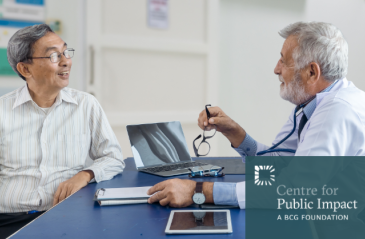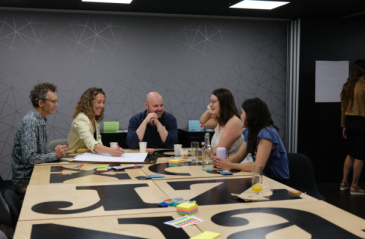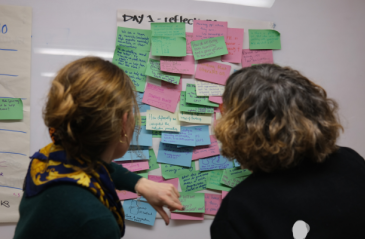
Latrobe Health Advocate: Fostering equitable and healthy societies through international collaboration

Ending epidemics and delivering health for all in Africa is the mission of @rosemarymburu
Share article@WACI_Tweets wants to ensure that everyone can count on decent standards of health care
Share article@WACI_Tweets seeks to influence the policymaking process – from the design to the implementation
Share articleWe put our vision for government into practice through learning partner projects that align with our values and help reimagine government so that it works for everyone.
Rosemary Mburu is clearly not one to shrink from a challenge. The sheer scope of her priorities as executive director of WACI Health - ending epidemics in Africa and transforming healthcare for all - mirrors the size and diversity of her beloved African continent. And yet her sunny disposition - she peppers her comments with laughter and optimism aplenty - also shows that she is anything but overwhelmed at the size of the task she has taken on.
“We are here to champion the end of life-threatening epidemics and deliver health for all in Africa,” she explains. “I know this sounds difficult. But it can be done. Remember that millions of lives have been saved already through global partnerships against diseases such as HIV, TB and malaria. And by continuing to build relationships and influence political priorities, we can help make this progress truly sustainable.”
Mburu has been in post for nearly five years, but the organisation predates her arrival. It was established in 1997 as World AIDS Campaign to focus on raising public awareness on specific issues in the global AIDS response - for example, it led the planning and observance of International World Aids Day.
In 2004, it became an independent NGO based in the Netherlands, but over several years it slowly shifted its focus to Africa. And then, in 2015, it rebranded as WACI Health, establishing itself as a regional advocacy organisation operating across the continent and broadening its scope and priorities in order to better align with the newly-launched Sustainable Development Goals (SDGs). “Although we made quite a bit of progress with the Millennium Development Goals, there was still a lot that was not accomplished,” concedes Mburu. “This meant there was a lot of unfinished business for the SDGs to take care of.”
She goes on to pinpoint the third SDG - “Ensure healthy lives and promote well-being for all at all ages” - as especially pertinent, particularly the notion that no-one should be left behind. “When we talk about achieving equity in health, this is very important for us,” continues Mburu. “It's not just about governments providing health services - we want to go further and identify who, and who isn't, receiving these services and why. Sometimes they miss out due to their sexual orientation or their ethnicity or simply because they live in rural areas. But our collective aim at WACI Health is to ensure that everyone can count on decent standards of healthcare.”
To achieve this aim, Mburu and her colleagues seek to influence political priorities through evidence-based research and civil society action, deploying three core strategies that define their approach: policy analysis and advocacy; strengthening civil society capacity; and civil society mobilisation and engagement.
“The last of these,” says Mburu, “is because we like to work with like-minded organisations and individuals who want to be champions for the causes that they push for. This is not just a strategy but is also an end in itself, where we can empower people's ability to take action and influence the decisions made by representatives at community level.”
Governments in Africa - just like their counterparts around the world, in both developed and developing countries - inevitably face huge demands on their finances. That's why WACI Health has pinpointed increasing resources for health as a key strategic objective. At the end of the day, sometimes money really does talk. “It comes down to being able to pay our healthcare workers or being able to afford basic medical supplies, let alone cutting-edge treatment,” she says.
But it's not just about the cash. Mburu and her colleagues also seek to influence the policymaking process - from the design to the implementation, which turns out to be of particular importance. “In Africa, we have a big challenge around implementation of policies,” she admits. “Much of this is down to the fact that we lack sufficient political will to actually deliver the proposals, and so we want to make sure that the policies which exist have a clear plan for their delivery.”
And accountability, too, is another key priority. “Our third strategic objective is around accountability of health governance,” explains Mburu. “You could say this is a cross-cutting element of everything we do, but we choose to have it as a standalone objective because we are looking at the mechanisms that foster accountability. We check to see that governments deliver what they said they would deliver and utilise the money that's allocated to health for its intended purposes. And this accountability is mutual - it extends to civil society in the work we do, the funding we receive, and the actions we take. We want to ensure we are accountable as well.”
There is little doubt that these are all noble aims. But how does Mburu actually go about achieving them? After all, they are hardly the easiest of tasks. She cites nurturing the right relationships as key. “We invest time in identifying the key people of influence and building and sustaining relationships with them,” she explains. “And we also deploy an ‘inside-outside' strategy. We like to be ‘inside' at the table where these decisions are being made. So if, for example, a country has a technical working group for a particular issue of interest to us, we work to ensure that there is a space there for civil society - so we can participate in that meeting and within the decision-making process.”
And from the ‘outside', WACI Health has an extensive array of activities, all aimed at helping to influence the debate and make their voice heard. “We send letters to representatives and decision-makers, we put out policy statements, we work with the media to raise our issues, and so on,” says Mburu. “All this is done in a very respectful way - we want decision-makers to be partners with us and engage constructively together.”
That said, when the need arises they have not hesitated to take to the streets in protest against issues such as a doctors' strike dragging on for weeks or a shortage of critical drugs. “If talking isn't preventing people from dying, we strive to draw more attention to these problems,” she says. “This helps push the government towards finding a solution. But again, this is respectful and not combative.”
WACI Health's activities span the continent, and Mburu is also keen to stress that their impact is greatly magnified by their collaborations. That's why they have set up a Civil Society platform - a forum and network of organisations engaged in the promotion, protection and enforcement of the right to health. And they also host the Global Fund Advocates Network, Africa hub, which aims to unite efforts from all over the world to support the fully-funded Global Fund to Fight AIDS, Tuberculosis and Malaria.
But it's not just about working with other organisations. People, too, are at the forefront of their actions. “We seek to connect with communities who live these experiences - the mother who has to queue all day for her baby to be seen, or the patient who is turned away from a clinic,” says Mburu. “These are the true experts at community level, and so we have built networks in different countries.”
This growing movement of people and organisations will help bring pressure to bear on governments to step up their domestic investments, ensuring that health systems and their governance and funding are country-owned, as opposed to being reliant on international development assistance. “Country ownership is, in the long run, going to guarantee sustainability,” she says. “But there is also a key message around shared responsibility and global solidarity. There are gaps that exist - pockets where services are not being accessed - and so international aid is critical in addressing these individual areas.”
The challenges facing the abundant healthcare systems that span Africa's continent are no doubt both complex and deeply rooted. But the impact of WACI Health and organisations like it shows that positive change is already well under way.
Mburu has little doubt of the importance of such work: “To make wealth and prosperity, you have to have a healthy population,” she concludes. “And that's exactly why we do what we do. Helping improve the health of our fellow Africans; it doesn't get much better!










